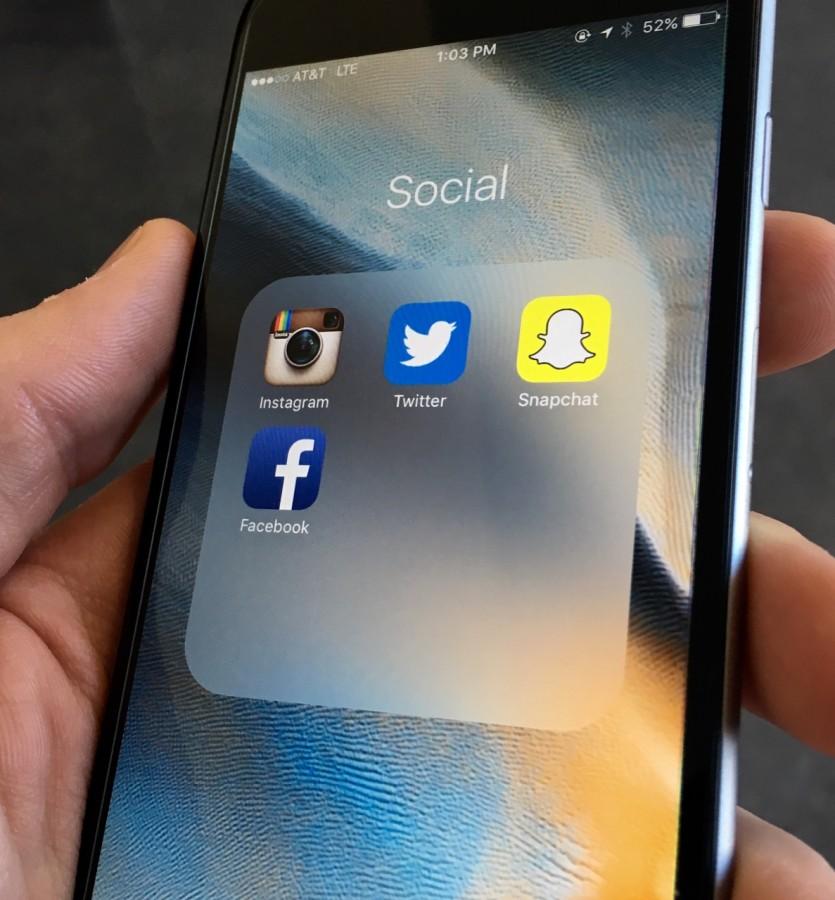Marketing a personal brand for yourself
How social media could potentially implicate one’s future
There is no question that our generation needs to understand the everlasting and inescapable effects of social media. Often times, employers research their prospective hires on social media sites to get better insight on who the applicant is outside of the interview process. In 2014, Money Magazine reported that 93% of recruiters look at social media profiles of prospective hires.
“Employers, recruiters, admissions officers, coaches, etc. are using social media to determine who you are as a person,” said Co-Founder of her own company, EPIC Coaching and Consulting, Dina Maloney. “A resume is a produced document that follows a structured framework. Social media gives them a bird’s-eye view of who you really are.”
EPIC Coaching and Consulting is a company designed to Empower People through Insight and Change. Last Monday, Maloney was invited to speak to Rachel Bentley’s senior English class about resumes and personal branding.
Maloney shared an interesting story about a football player who was one of the top cornerback recruits in the country in 2012. The student-athlete was expelled from a private Catholic school in New Jersey, and lost his scholarship to Michigan ‘because’ or ‘due to’ his posts on Twitter. Maloney generalizes the following advice for all students who could potentially suffer the consequences of their posts on social media.
“If you want to be seen as responsible, ethical, and hire-worthy, it is fully within your circle of control to create that ‘personal brand’ for yourself,” said Maloney. “If you make decisions such as posting inappropriate, offensive, unethical, or, even worse, illegal content and pictures on social networks and you suffer damaging consequences, then you have no one to blame but yourself. Teenagers today want the ability to be true to who they are – which is a positive – but they need to understand that there will be qualifications and expectations from those who have a significant impact on their lives.”
Career Development Coordinator, Sarah Joyner, explained both the pros and cons about social media.
“From a student’s perspective, I think that social media is both a good and bad thing,” said Joyner. “When I was in school, I didn’t have the same networking opportunities you all do. I know most students are using Twitter and what not, but LinkedIn, a professional social media site, can actually find professionals and find jobs. The bad part of social media is that I think most teenagers don’t realize that once they post something, it stays there. Even if they think that they’ve deleted it, there is still a footprint of it.”
To many social media outlets, specifically Facebook, the term ‘delete’ doesn’t quite mean the same thing to them as it would generally mean to the user. In case anyone has ever accepted Facebook’s Terms and Conditions without actually reading them, the following is one of the clauses a user presumably understands and fully agrees to:
“When you delete IP content, it is deleted in a manner similar to emptying the recycle bin on a computer,” it states. “However, you understand that removed content may persist in backup copies for a reasonable period of time (but will not be available to others).”
Essentially, emptying the recycle bin on a computer does not necessarily get rid of the information. Whether the data is active, archivable or latent, it often remains stored on the computer. So really, the user didn’t actually ‘delete’ anything. But they already knew that since they agreed to it, right?
Assistant Principal, Anson Robinson, explained how social media could interfere with the hopes of landing a potential job.
“For a lot of employers, it’s hard to decipher worthy applicants out there,” said Robinson. “Employers have to find ways to weed out people who they think would not be a good fit for their company or organization. Their next thought is, ‘let me check social media.’ In the interview process, you are going to give them your best face. The employer could run a background check or call [the applicant’s] references, but they are still faced with the question, who really is that person? Social media gives them a good view of that person’s personality and establishes things they can’t really gage in an interview process.”
A new survey from CareerBuilder.com found that 51% of employers who research job candidates on social media said that they have found content that caused them to not hire the candidate.
“When you’re in high school, you really are not thinking about the implications that your posts can make on your future,” said Joyner. “Even [if you use] inappropriate language, you are not really thinking it is that big of a deal. But once it is on the Internet, it is on the Internet. You can not take it back, so you really need to consider what you post before putting it online.”
Student Body Vice President, Samantha Begin, explained the role and importance social media has on students’ lives.
“Social media can be very time consuming and can have a negative impact on students that use it for the wrong reasons,” said senior, Samantha Begin. “Although it is good for laughs and keeping up with others, people need to be smart with what they post online. If you want people to respect you, you don’t want to post crude or disrespectful things on social media. So be cautious not to say anything that could come back and haunt you later on.”











